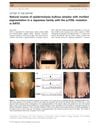
Tacrolimus causes fewer acute rejections than cyclosporin A in kidney transplants but doesn't necessarily improve kidney function after one year; cardiovascular risks and side effects vary between the two drugs.
 June 2019 in “International journal of dermatology and venereology”
June 2019 in “International journal of dermatology and venereology” A man developed skin issues from cancer medication, which improved with specific treatments.
 July 2018 in “British Journal of Dermatology”
July 2018 in “British Journal of Dermatology” Mindfulness reduces anxiety and depression in skin disease patients; dermatologists and psychiatrists often lack confidence in treating psychodermatological conditions.
 November 2013 in “John Wiley & Sons, Ltd eBooks”
November 2013 in “John Wiley & Sons, Ltd eBooks” The document concludes that accurate diagnosis of male and female gonadal disorders is crucial for effective treatment and better patient outcomes.
 July 2003 in “Journal of Cutaneous Medicine and Surgery”
July 2003 in “Journal of Cutaneous Medicine and Surgery” The document concludes that various treatments for skin conditions are effective, but some require further research, and certain factors like gender and lifestyle can influence disease outcomes.
 July 2003 in “Journal of Cutaneous Medicine and Surgery”
July 2003 in “Journal of Cutaneous Medicine and Surgery” High blood pressure drugs often cause skin lupus, stopping the drug usually helps. A vaccine helps prevent genital herpes and HPV-16. More frequent light therapy clears psoriasis faster. No link was found between low iron and chronic hair loss.
 July 2003 in “Journal of Cutaneous Medicine and Surgery”
July 2003 in “Journal of Cutaneous Medicine and Surgery” Skin problems are common in Bangladesh due to arsenic, prompt treatment of diabetic foot ulcers is crucial, maternal transmission causes most neonatal herpes, treatments for pediatric vasculitis are effective, the chickenpox vaccine works, more frequent UVB therapy helps psoriasis, certain jobs increase hand dermatitis risk, monoclonal antibodies treat psoriasis well, lifestyle affects psoriasis, alefacept improves psoriasis, imiquimod cream partially clears basal cell carcinoma, and iron may not help chronic hair loss.
 July 1997 in “Journal of Cutaneous Medicine and Surgery”
July 1997 in “Journal of Cutaneous Medicine and Surgery” Finasteride significantly increases scalp hair and prevents hair loss in young and middle-aged men.
 July 2011 in “British Journal of Dermatology”
July 2011 in “British Journal of Dermatology” Dermatologists give better information on pathology forms, hypersensitivity vasculitis is a common skin issue, misdiagnoses can occur, and various skin conditions are linked to loss of elastin or genetic factors.
29 citations,
June 2020 in “International Journal of Molecular Sciences” Notch signaling disruptions can cause various skin diseases.
 1 citations,
April 2024 in “Skin research and technology”
1 citations,
April 2024 in “Skin research and technology” Topical rosuvastatin and melatonin creams significantly reduce psoriasis severity and are safe.
 July 2023 in “Dermatology practical & conceptual”
July 2023 in “Dermatology practical & conceptual” Women with Female Pattern Hair Loss may experience more stress, anxiety, and depression, and have lower levels of BDNF, which could predict the psychological impact.
 45 citations,
April 2019 in “International Immunology”
45 citations,
April 2019 in “International Immunology” The study concluded that immune cells attacking hair follicles cause hair loss in alopecia, with genetics and environment also playing a role, and highlighted the potential of certain treatments.
 55 citations,
May 2019 in “Journal of Endocrinology”
55 citations,
May 2019 in “Journal of Endocrinology” Androgens are important for female fertility and could help in IVF treatment, but also play a role in causing PCOS.
40 citations,
June 2021 in “Clinical, cosmetic and investigational dermatology” JAK inhibitors show promise in effectively treating hair loss from alopecia areata.
 5 citations,
January 2017 in “Acta Endocrinologica”
5 citations,
January 2017 in “Acta Endocrinologica” High androgen levels in postmenopausal women may suggest an ovarian tumor, and removing it can improve heart and metabolic health.
3 citations,
July 2023 in “International journal of molecular sciences” Stress may contribute to hair loss in alopecia areata by affecting immune responses and cell death in hair follicles.
March 2024 in “Current issues in molecular biology” Personalized medicine in dermatology uses molecular biomarkers to improve diagnosis and treatment but needs further advancements for practical use.
 August 2022 in “Case reports”
August 2022 in “Case reports” Isotretinoin effectively treated a rare scalp condition, but careful drug monitoring and a dairy-free diet were important.
 11 citations,
January 2016 in “The Journal of Sexual Medicine”
11 citations,
January 2016 in “The Journal of Sexual Medicine” Young women with nonclassic congenital adrenal hyperplasia may experience worse sexual function and mild depression compared to healthy women.
280 citations,
May 2005 in “Andrology” Testosterone treatment for older men can have short-term benefits, but long-term risks are unclear, requiring careful evaluation and monitoring.
 20 citations,
January 2005 in “Australasian Journal of Dermatology”
20 citations,
January 2005 in “Australasian Journal of Dermatology” A woman had a skin condition with increased normal elastic fibers, not related to other known disorders, likely due to aging.
 December 2018 in “Meandros medical and dental journal”
December 2018 in “Meandros medical and dental journal” A man developed a rare late-onset hair-pulling disorder, usually seen in younger people.
 5 citations,
May 2011 in “European Journal of Medical Genetics”
5 citations,
May 2011 in “European Journal of Medical Genetics” A genetic duplication on chromosome 5 was linked to a woman's unique combination of medical conditions.
 2 citations,
January 2018 in “Annals of Dermatology”
2 citations,
January 2018 in “Annals of Dermatology” Early hair loss may be linked to metabolic syndrome.
December 2022 in “Journal of Pharmaceutical Negative Results” Late onset of first period and irregular development of sexual traits in teenage girls can lead to poorer reproductive health.
 40 citations,
February 1990 in “Journal of The American Academy of Dermatology”
40 citations,
February 1990 in “Journal of The American Academy of Dermatology” A 17-year-old developed woolly hair nevus in adolescence, which is unusual, and over time the hair darkened and straightened slightly, but microscopic changes persisted.
 3 citations,
January 2019 in “Journal of Dermatology”
3 citations,
January 2019 in “Journal of Dermatology” The p.P25L mutation in the KRT5 gene causes a rare skin condition that worsens over time and may lead to hair loss starting in young adulthood.
 2 citations,
January 2002 in “Hormone Research in Paediatrics”
2 citations,
January 2002 in “Hormone Research in Paediatrics” Molecular diagnostics help identify genetic defects causing endocrine diseases, improving diagnosis and treatment options.
 56 citations,
June 2001 in “European journal of cardiovascular prevention & rehabilitation”
56 citations,
June 2001 in “European journal of cardiovascular prevention & rehabilitation” Early balding linked to higher heart disease risk.























